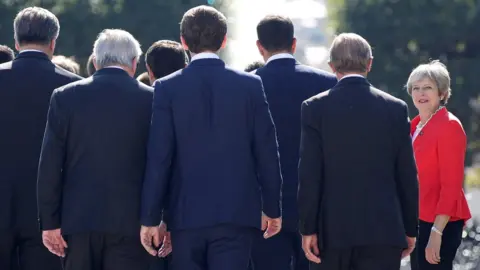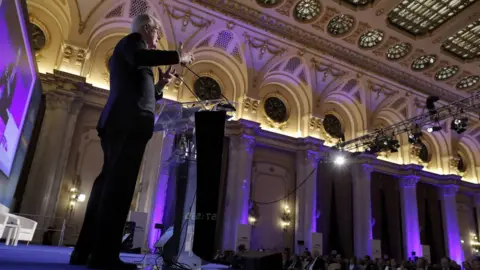Brexit: Will EU leaders agree to an extension?
 Reuters
ReutersIn contrast to the sound and fury coming out of Westminster on Thursday night, the silence on EU leaders' Twitter accounts was deafening.
In part it is surely a stunned silence. Europe's politicians gaze open mouthed at the maelstrom of division and chaos currently whirling through the House of Commons.
Three years after the UK voted to leave the EU - two weeks before the official Brexit day - Parliament appears to be in meltdown with no unifying solution in sight.
EU politicians breathe deep, shuddering sighs at the thought of prolonging the cross-Channel agony of the Brexit process.
So will they or won't they agree to an extension? What conditions could they demand and how long would Brexit be delayed by?
Like so many things to do with Brexit - the answer is: we're not 100% certain.
Earlier this week, a number of EU leaders including France's Emmanuel Macron, Mark Rutte of the Netherlands and Spain's Pedro Sanchez sounded pretty hard-line.
They wouldn't agree to delay Brexit, they said, unless the prime minister came up with a very good reason.
EU leaders are frustrated, irritated and fatigued by the Brexit process but it's also worth bearing in mind that they have two specific audiences in mind these days when they take to the cameras:
- UK MPs whom the EU wishes to pressure into voting for Theresa May's negotiated deal or something else Brussels believes to be realistic
- EU citizens about to cast their ballots in the upcoming elections for the European parliament. The EU's intended message to them: We're tough on those who mess with our club, so don't vote for Eurosceptic nationalists like Marine Le Pen!
 EPA
EPAEU leaders' silence after Thursday's vote by the House of Commons to delay Brexit may also have been because they realise - whatever their individual opinions on an extension - that they are obliged by law to come to a unanimous decision. And they won't reach that decision until they are all stuck in a room together, which they will be at an EU summit in a week's time.
In the meantime, former UK Independence Party (UKIP) leader Nigel Farage says he is lobbying countries to make sure at least one of them vetoes a Brexit delay.
But that rather overplays Mr Farage's power of influence on European governments. His claim is little more than a publicity stunt.
The EU's final decision on an extension will be dictated by political and economic self-interest.
Delaying Brexit will prolong the uncertainty for European businesses and citizens - and ensure that the issue continues to hang over EU affairs.
But EU leaders don't want to be blamed by their voters for a costly no-deal Brexit either. An extension might avoid that.
So, tough talk aside, realpolitik is likely to win the day.
It could be a longer-term extension, favoured by European Council President Donald Tusk in order to give the UK time for a "rethink", he says.
Or a shorter extension, if Mrs May can show next week that she's close to parliament approving her deal.
EU leaders will probably say yes to a Brexit extension, even if it's through gritted teeth, though they may decide not take a final decision next week.
